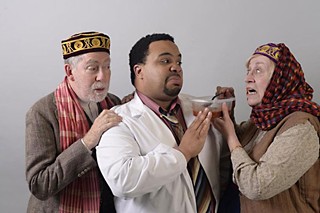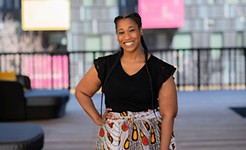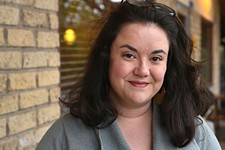The Language Archive
Different Stages' production explores the difficulty of articulating not just love but also marriage
Reviewed by Stacy Alexander Evans, Fri., Jan. 17, 2014

City Theatre, 3823-D Airport, 512/926-6747
www.main.org/diffstages
Through Feb. 1
Running time: 2 hr., 5 min.
The French literary theorist Roland Barthes says that "to try to write love is to confront the muck of language: that region of hysteria where language is both too much and too little, excessive and impoverished." Such a philosophy lies at the heart of Julia Cho's The Language Archive. Although Barthes is not alone in his assertion that the language of love is difficult to articulate, Cho – and in particular the cast and crew of Different Stages' production – explore not only the inherent challenges of emotional connectedness, but a state of affairs even more unnatural and baffling: the social contract of marriage.
At the center of this story, as in Edward Albee's gut-wrenching marital exposé Who's Afraid of Virginia Woolf?, are two married couples at different stages in their relationships. In both cases, the device serves to contrast levels of maturity and depth in marriage. B. Iden Payne Award-winning actress Jennifer Underwood turns in another stellar performance here as the elder wife Ulta, her face full of so much comical cynicism that the audience can't help but laugh, even before she opens her mouth to speak.
She and her partner Resten (Norman Blumensaadt) have a "successful" marriage. Far from the idyllic couples of happy marriages that play out in our heads – those who don't fight about money and have unwaveringly fantastic sex – Ulta and Resten have become expert at mining for diamonds. They shout and raise their fists, but soldier on, undeterred by the threat of gas explosions and the occasional roof collapse.
In contrast, the younger marrieds – the linguist George and the dissatisfied wife, Mary (Circe Sturm), who leaves him – are not survivors. On paper, George is self-involved and cerebral, though perhaps through no fault of his own, as his character traits fit the profile of someone with an autism spectrum disorder. Trevor Bissell is fabulous, though probably fabulously miscast as the polyglottal George. One wonders how much more conflicted his errant wife would have been had she been faced not with the anxious neuroses of Richard Lewis, but with the brooding oblivion of Benedict Cumberbatch.
Katherine Schroeder shines in a relatively minor role as a language instructor, putting a spotlight on the ways in which the student-teacher relationship mirrors that of a romantic coupling – each partner alternating in the passive-active roles of tutelage. Indeed, one's success in relationships often depends upon an ability to constantly learn and adapt to new patterns.
Designer Ia Ensterä's set is pleasantly academic if gastronomic, the colors evocative of pumpkin and chocolate with a touch of blueberry. She and the rest of this production team have their work cut out for them, considering the show's many short scenes and attendant changes. The frenetic pace of these transitions threatens to be a distraction at times, yet how like the challenges of romantic relationships themselves, demanding as they do our constant revision and cultivation.












